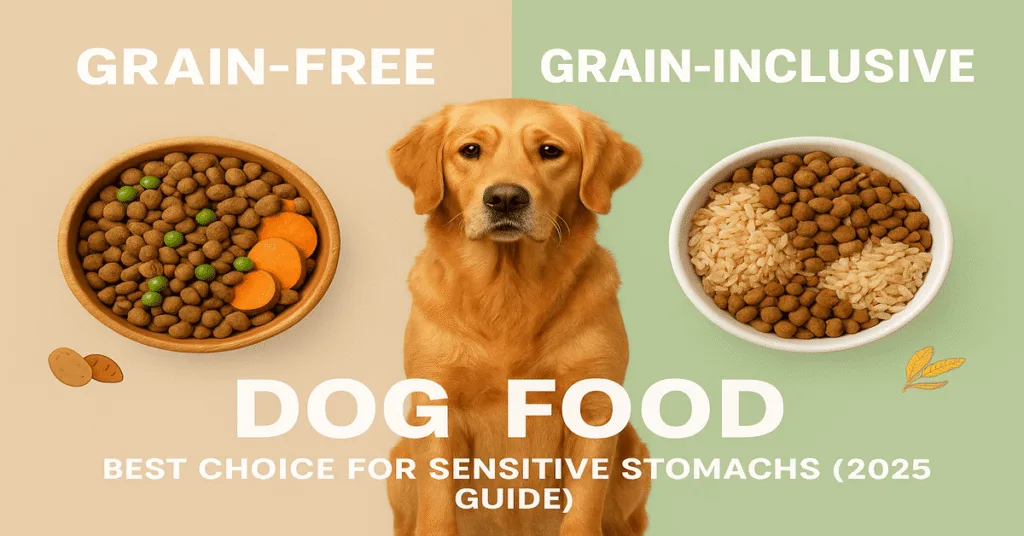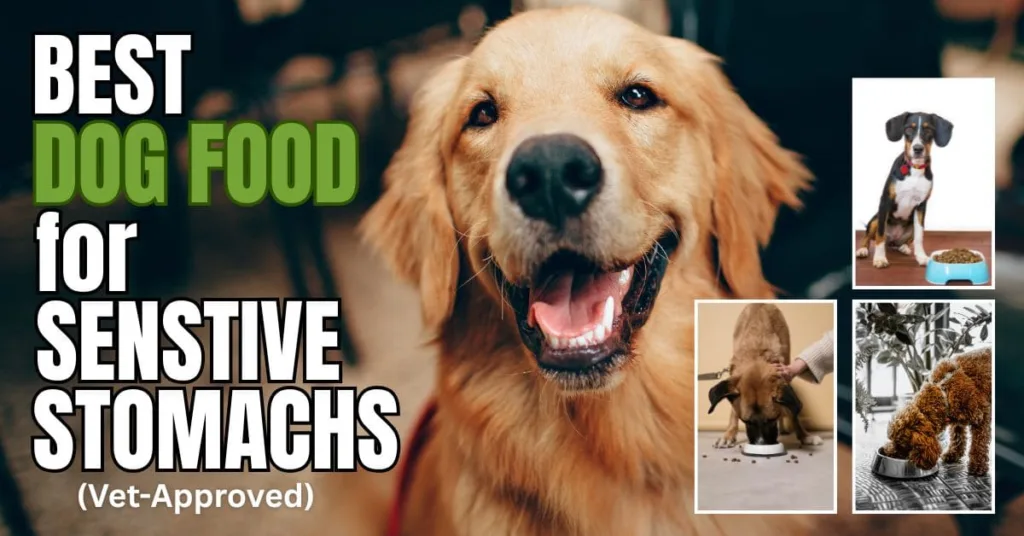For many pet parents in the United States and other Tier-1 countries, choosing the right food for dogs with tummy troubles can feel overwhelming. Walk into any pet store and you’ll see labels boasting “grain free” or “made with healthy grains.” But when it comes to a sensitive stomach, which option actually works best?
In this 2025 vet-approved guide, we’ll compare grain free vs grain inclusive dog food for sensitive stomachs—breaking down the pros, cons, myths, and vet recommendations so you can make the best decision for your pup’s digestive health.
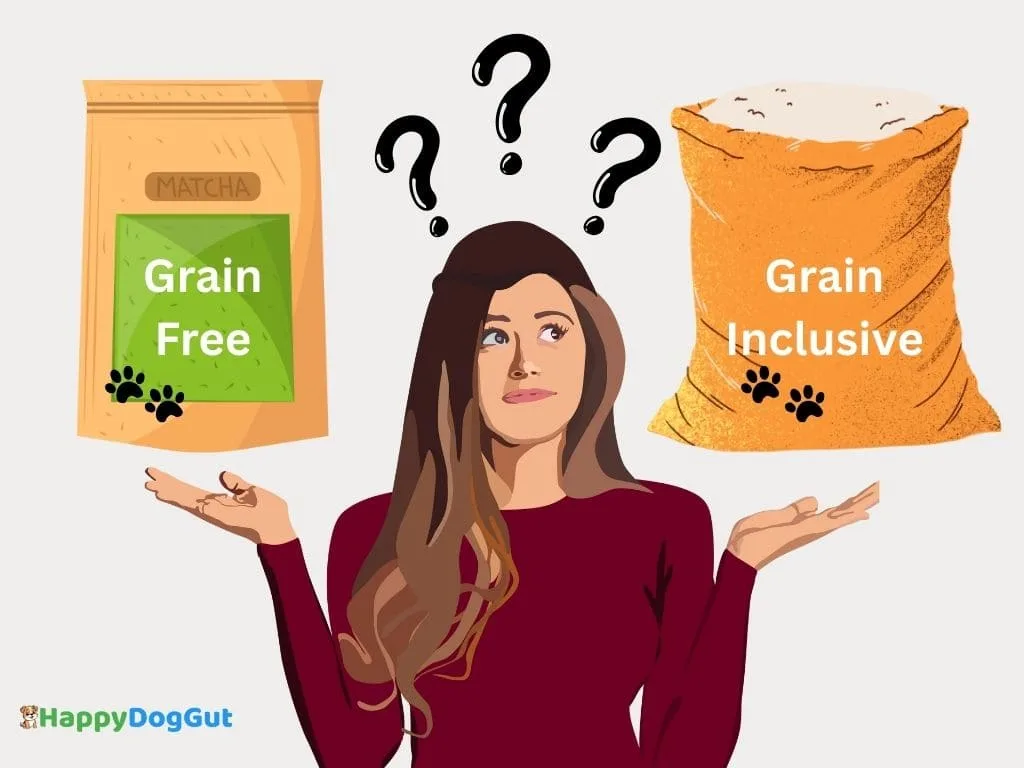
Understanding Sensitive Stomachs in Dogs
Just like people, some dogs have more delicate digestive systems that react strongly to certain foods or feeding habits. A sensitive stomach isn’t a disease on its own—it’s a collection of symptoms that indicate your pup’s digestive system is easily upset.
Common Signs of a Sensitive Stomach
Pet parents often notice that dogs with sensitive stomachs may struggle with:
- Recurring diarrhea – Loose stools or frequent potty breaks.
- Vomiting after meals – Some dogs throw up occasionally or regularly after eating.
- Gas and bloating – Excessive flatulence or visible discomfort after meals.
- Loss of appetite – Refusal to eat or selective eating habits.
- Poor nutrient absorption – Signs like weight loss, low energy, or a dull coat.
If these issues happen often, it’s a red flag that your dog’s digestive system isn’t handling their current food well.
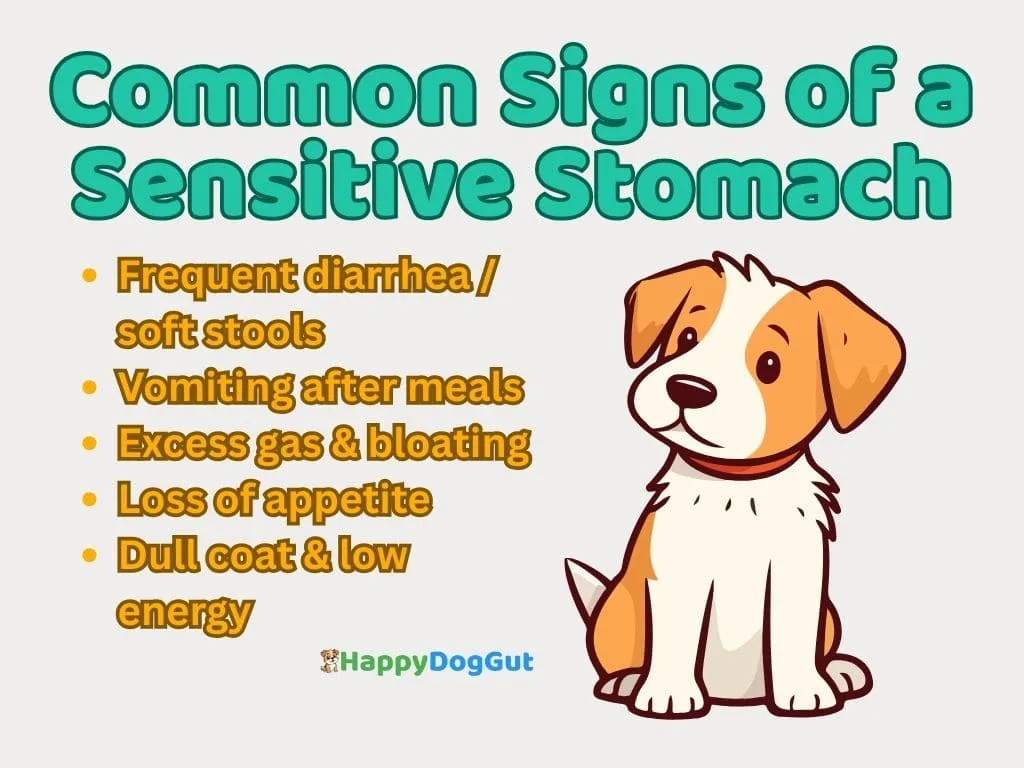
Why Do Dogs Develop Sensitive Stomachs?
There isn’t one single cause. Some pups react to specific ingredients, while others may struggle with poor-quality fillers, artificial additives, or sudden food changes. In certain cases, the root issue may be an underlying medical condition.
👉 If you’d like a deep dive into causes and vet-approved solutions, check out our detailed guide: What Causes Sensitive Stomach in Dogs? Symptoms & Vet Advice (2025 Guide).
Why Choosing the Right Diet Matters
For dogs with sensitive digestion, food is more than just fuel—it’s medicine for the gut. The right formula can:
- Improve stool quality and reduce diarrhea
- Minimize bloating, gas, and discomfort
- Support nutrient absorption and energy levels
- Promote a shinier coat and healthier skin
This is why selecting the best diet—whether grain free or grain inclusive dog food for sensitive stomachs—is such an important step in keeping your dog happy, healthy, and comfortable.
Check out our full 2025 vet-approved guide to the best dog food for sensitive stomachs.
What Is Grain Free Dog Food?
Grain-free dog food is any formula that does not contain traditional grains such as corn, wheat, rice, oats, or barley. Instead, these diets use alternative carbohydrate sources like:
- Potatoes
- Peas
- Lentils
- Chickpeas
- Tapioca or sweet potatoes
The original idea behind grain-free diets was to replicate what dogs’ wild ancestors might have eaten, focusing more on meat and non-grain carbs. As the trend grew, many US pet owners believed grains were the leading cause of digestive problems in dogs and switched to grain-free options.
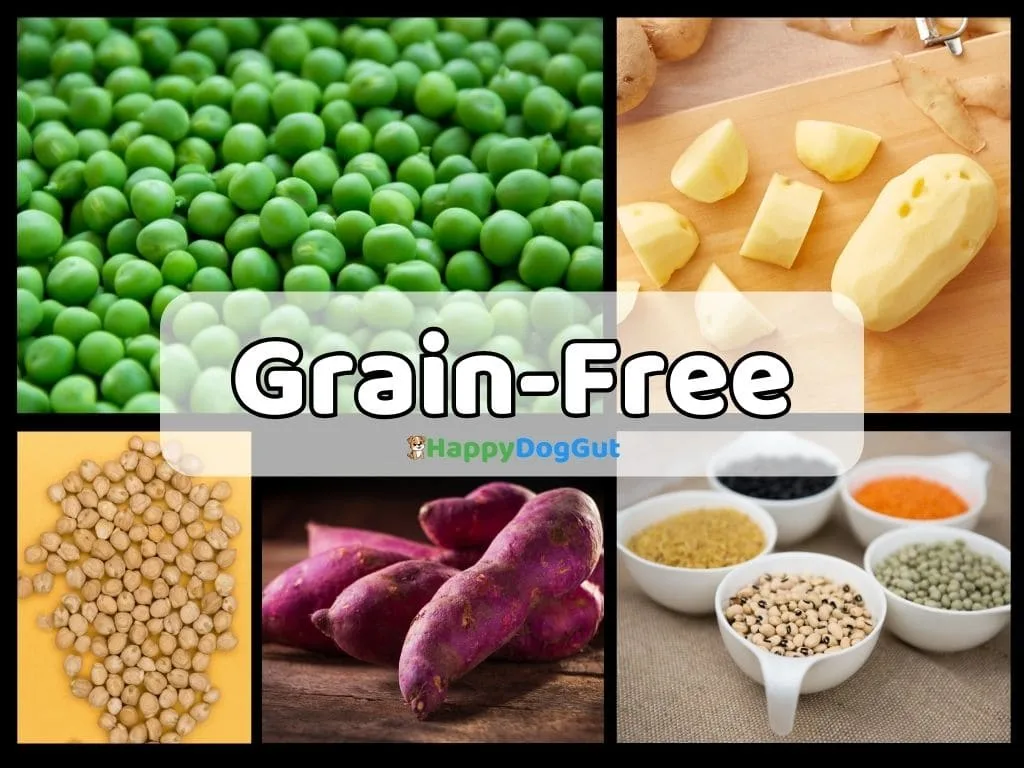
Why Some Pet Parents Choose Grain-Free
- Concern that grains cause allergies or stomach upset
- Belief that a “high-protein, low-carb” diet is more natural for dogs
- Marketing claims that grain-free food is healthier or of higher quality
But Is Grain-Free Always Better for Sensitive Stomachs?
Not necessarily. While grain-free dog food can benefit certain dogs—especially those with a confirmed grain allergy or intolerance—it’s not a one-size-fits-all solution.
- Many sensitive stomach issues are actually triggered by protein sources (like beef or chicken) rather than grains.
- Grain-free formulas often rely heavily on legumes (peas, lentils, chickpeas), which can cause gas, bloating, and digestive upset in some dogs.
- The FDA has raised concerns about a potential link between certain grain-free diets (especially legume-heavy ones) and heart disease in dogs (DCM).
This means that while grain-free dog food for sensitive stomachs may help some pups, it’s not automatically the safest or most effective choice.
If grain isn’t the issue but ingredient overload is, a single-protein LID formula may work better. Explore the Best Limited Ingredient Dog Foods for Sensitive Stomachs to help narrow down triggers.
What Is Grain-Inclusive Dog Food?
Grain-inclusive dog food is any formula that contains wholesome, digestible grains. Unlike the old myth that “all grains are fillers,” many of these grains actually provide valuable nutrition for dogs—especially those with sensitive stomachs. Common healthy grains found in premium dog foods include:
- Brown rice – A gentle, easily digestible carbohydrate that supports steady energy.
- Oatmeal – Rich in soluble fiber, which helps regulate digestion and firm up stools.
- Barley – A slow-release energy source packed with fiber, vitamins, and minerals.
- Sorghum – A gluten-free grain that supports balanced blood sugar and gut health.
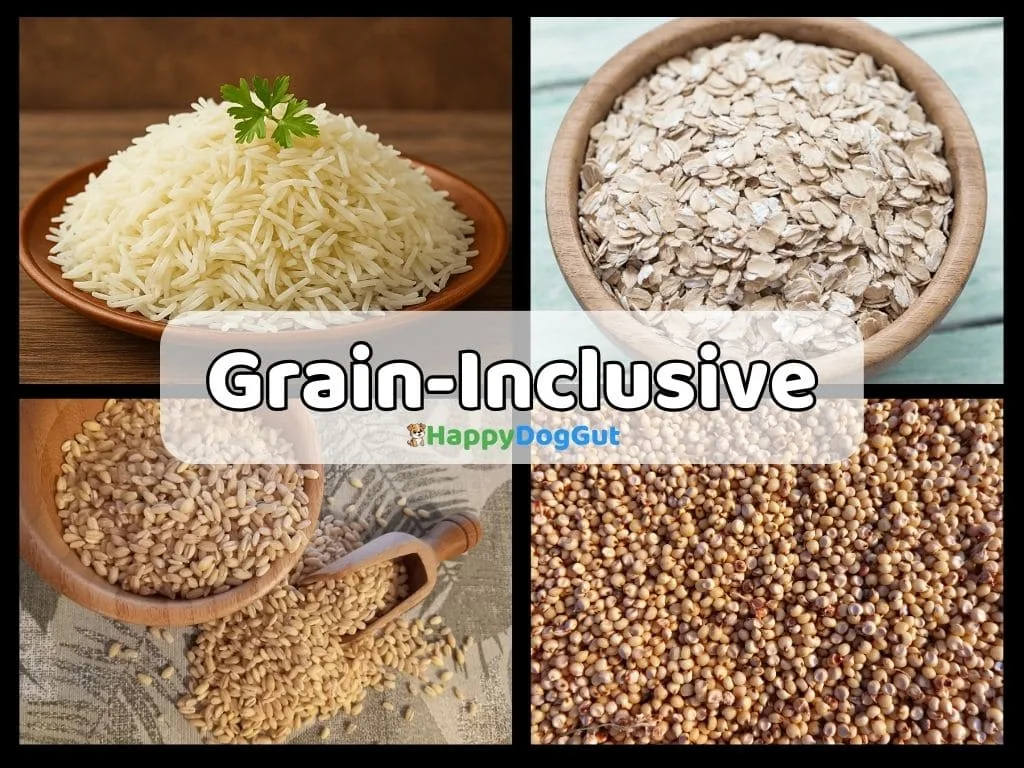
Benefits of Grain-Inclusive Diets
High-quality grains are not just “fillers”—they play an important role in your dog’s overall health:
- Steady energy – Complex carbs prevent energy spikes and crashes.
- Better digestion – Soluble fiber helps regulate the digestive system and reduce diarrhea.
- Gut health support – Fiber acts as a prebiotic, feeding healthy gut bacteria.
- Essential nutrients – Grains naturally contain B vitamins, magnesium, iron, and antioxidants.
Why Grain Inclusive May Help Sensitive Stomachs
For many dogs with digestive issues, grain-inclusive diets are actually easier on the stomach than legume-heavy grain-free formulas. Dogs have evolved alongside humans for thousands of years, developing the enzymes needed to digest cooked grains efficiently. That’s why many veterinarians in the US recommend starting with a grain-inclusive formula if your dog struggles with tummy troubles.
AAFCO explains that most complete and balanced dog foods, including grain-inclusive formulas, are designed to meet digestive and nutritional needs across life stages, and grains are not a common source of food intolerance in dogs.
By choosing a high-quality, grain-inclusive food—especially those made with rice or oatmeal—you can often improve stool quality, reduce gas, and give your dog a more balanced diet.
Grain Free Dog Food for Sensitive Stomachs: Pros & Cons
✅ Pros
- Helpful if your dog is allergic or intolerant to grains
- Typically higher in protein
- No cheap grain fillers
❌ Cons
- FDA research links some grain-free diets to canine heart disease (DCM)
- Legumes (peas, lentils) may cause bloating or gas
- Often more expensive
Verdict: Grain-free may help certain dogs, but it is not a one-size-fits-all solution for sensitive stomachs.
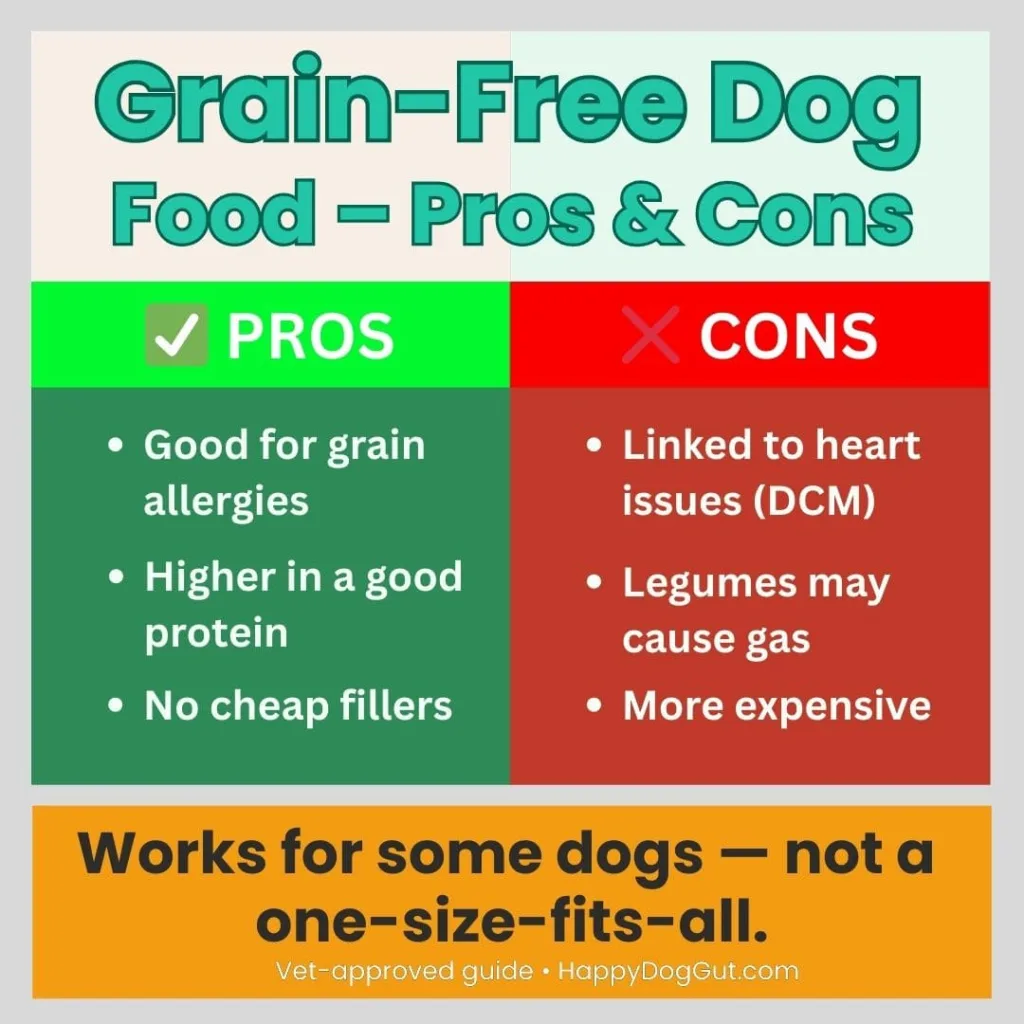
Grain Inclusive Dog Food for Sensitive Stomachs: Pros & Cons
✅ Pros
- Digestible grains like rice and oatmeal are gentle on the stomach
- Natural fiber improves stool quality
- More affordable than grain-free options
- Provide essential nutrients not found in legume-heavy diets
❌ Cons
- Rare cases of grain intolerance or allergy
- Cheap kibble brands may still use fillers
Verdict: For most US dogs with sensitive stomachs, grain-inclusive diets are a safer and more balanced choice.
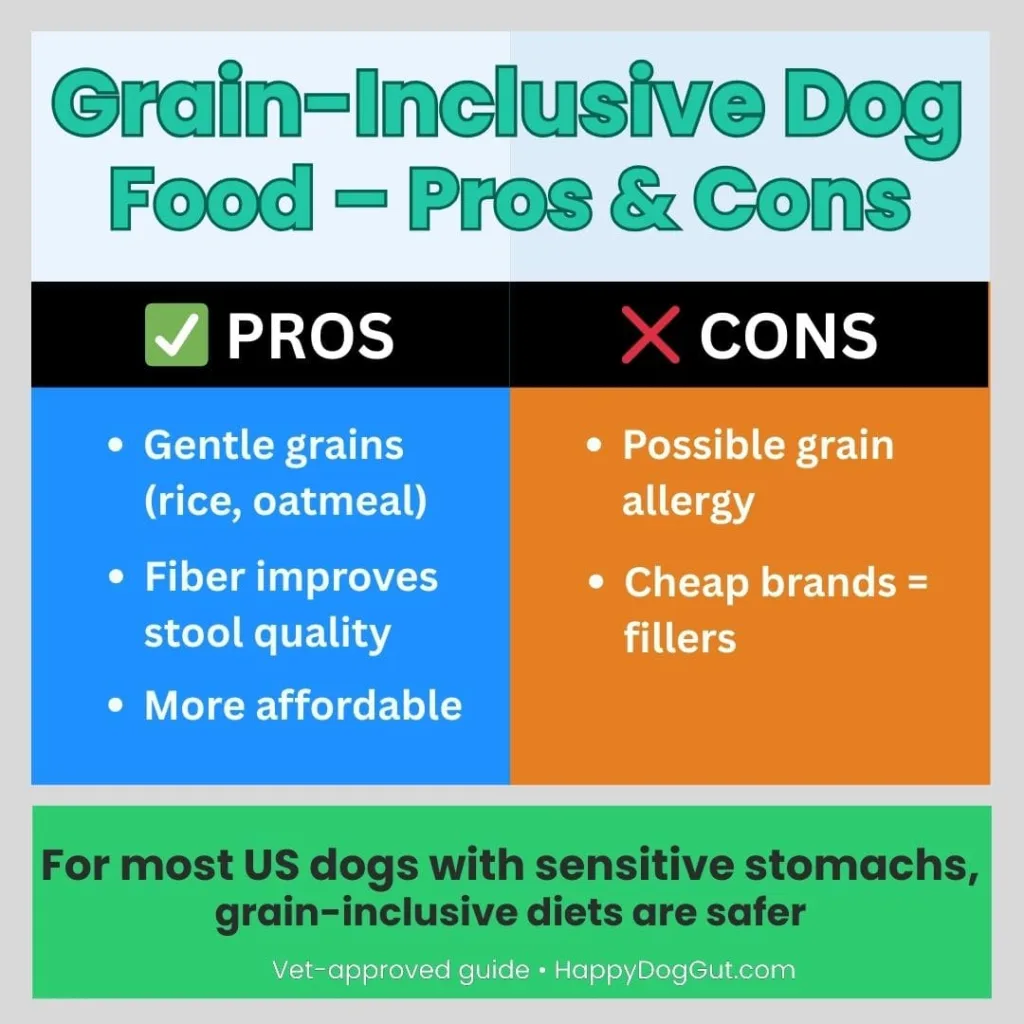
Vet Opinions: Grain-Free vs Grain-Inclusive Dog Food for Sensitive Stomachs
When it comes to sensitive stomachs, most veterinarians in the United States recommend starting with a grain-inclusive formula—unless your dog has a confirmed grain allergy. That’s because digestible grains like rice and oatmeal are gentle on the stomach, provide natural fiber, and help improve stool quality.
What Vets Say About Grain-Free Diets
While grain-free foods became popular among American pet parents in the last decade, veterinarians urge caution:
- The FDA has investigated potential links between certain grain-free diets (especially those heavy in peas, lentils, and other legumes) and a heart condition called canine dilated cardiomyopathy (DCM).
- Legume-heavy recipes may cause digestive upset such as gas, bloating, or loose stools in sensitive dogs.
- Many cases of “grain sensitivity” are actually due to protein intolerances (like chicken or beef), not grains.
What Vets Prioritize in Dog Food Selection
Instead of focusing only on buzzwords like “grain-free” or “all-natural,” veterinarians stress the importance of:
- Ingredient quality – Whole grains, real meat proteins, and minimal fillers.
- Digestibility – Easily absorbed nutrients that don’t stress the stomach.
- Balanced nutrition – Complete vitamins, minerals, and amino acids for long-term health.
- AAFCO compliance – Ensuring the food meets the United States nutritional standards for dogs.
For most dogs with sensitive stomachs, a vet-recommended grain-inclusive diet is the best starting point. If symptoms don’t improve—or if your vet suspects an allergy—then a carefully selected grain-free, limited-ingredient diet may be worth testing under veterinary supervision.
How to Choose the Right Diet for a Sensitive Stomach (Step-by-Step)
- Consult Your Vet – Rule out medical causes.
- Start with Grain-Inclusive – Rice or oatmeal-based formulas are gentler.
- Identify Symptoms – Diarrhea, bloating, or food refusal?
- Test Grain-Free If Needed – Limited ingredient grain-free diets can help with specific intolerances.
- Monitor for 4–6 Weeks – Track stool quality, appetite, and energy levels.
Some pet parents also prefer preparing meals at home to control ingredients better. If you’re interested, check out our Homemade Dog Food for Sensitive Stomachs guide for vet-approved recipes
Common Myths About Dog Food and Grains
When it comes to grain-free vs grain-inclusive dog food for sensitive stomachs, there’s a lot of confusion among pet parents. Marketing buzzwords often spread myths that don’t hold up under veterinary science. Let’s break down some of the most common misconceptions:
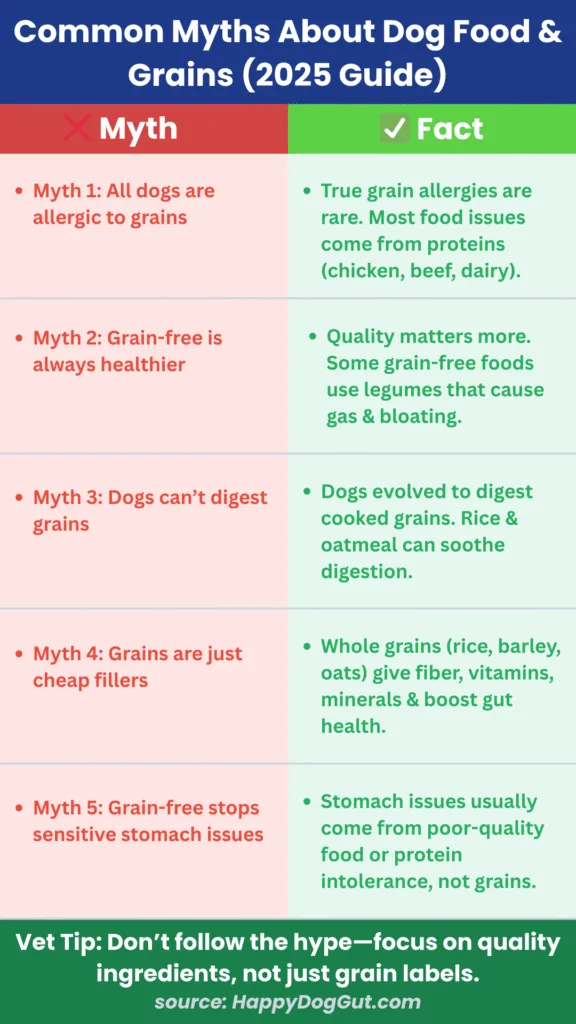
Myth 1: All dogs are allergic to grains
Fact: True grain allergies in dogs are extremely rare. According to vets, most food allergies are actually linked to proteins such as beef, chicken, or dairy. If your dog shows digestive issues, it’s far more likely to be caused by a protein intolerance than by grains.
Myth 2: Grain-free dog food is always healthier
Fact: Grain-free doesn’t automatically mean better. Some grain-free formulas are packed with legumes and starches that may cause gas, bloating, or even long-term health concerns. The overall quality of ingredients matters more than whether a food is labeled “grain-free.”
Myth 3: Dogs can’t digest grains
Fact: Unlike wolves, domestic dogs have evolved alongside humans for thousands of years. They developed enzymes like amylase, which allow them to digest cooked grains efficiently. For many dogs, grains such as rice and oatmeal are actually soothing and beneficial for digestion.
Myth 4: Grains are just cheap fillers
Fact: While some low-quality kibble brands may use corn or wheat in excess, wholesome grains like brown rice, barley, and oats provide valuable fiber, vitamins, and minerals. These nutrients support digestive health, energy levels, and coat condition.
Myth 5: A grain-free diet will prevent sensitive stomach issues
Fact: Sensitive stomachs are usually triggered by ingredient intolerances, poor-quality food, or medical conditions—not simply by grains. Switching to grain-free may help some dogs, but it’s not a guaranteed solution and should only be considered after consulting your veterinarian.
Best Vet-Approved Dog Foods for Sensitive Stomachs (2025 List)
🥇 Grain-Inclusive Options
- Hill’s Science Diet Sensitive Stomach & Skin
- Purina Pro Plan Sensitive Skin & Stomach (Salmon & Rice)
- Royal Canin Digestive Care
🥇 Grain-Free Options
- Merrick Limited Ingredient Grain-Free
- Blue Buffalo Basics Grain-Free Turkey & Potato
- Natural Balance LID Sweet Potato & Salmon
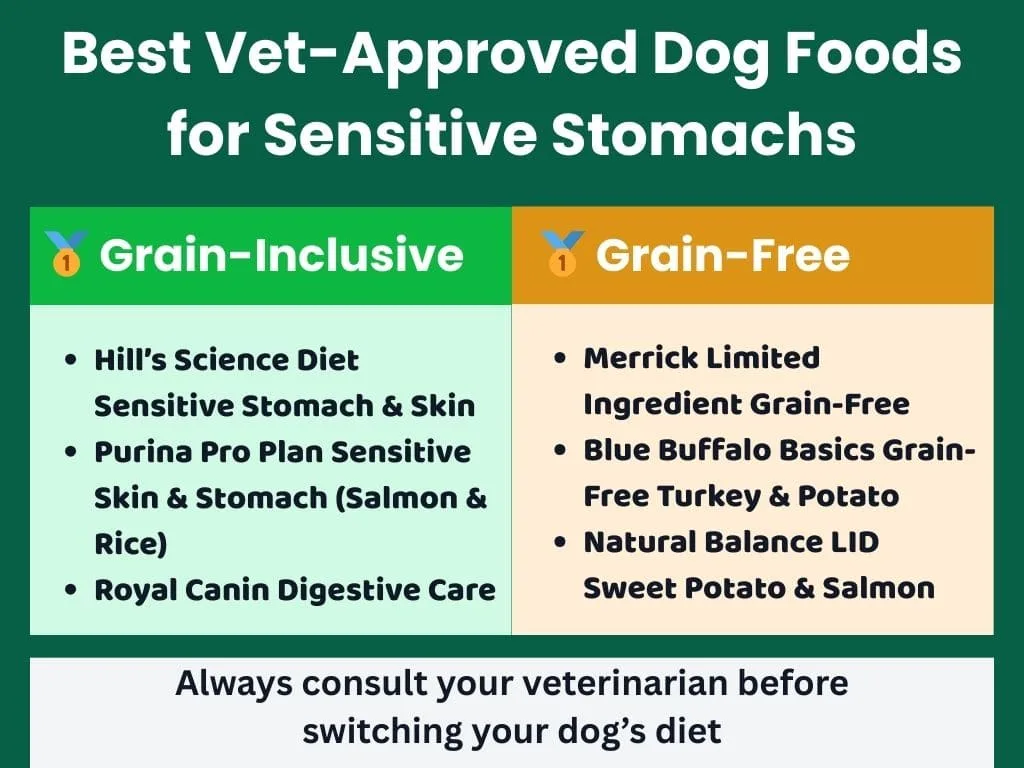
Frequently Asked Questions (FAQ)
Which is better for sensitive stomachs — grain-free or grain inclusive?
For most dogs, grain-inclusive diets are easier to tolerate, especially when they contain gentle grains like rice or oatmeal. However, some dogs with specific intolerances may do better on limited-ingredient grain-free diets. Always consult your vet before making the switch.
Are grains bad for dogs with sensitive digestion?
No. In fact, cooked, digestible grains such as brown rice, barley, or oatmeal often help improve digestion, firm up stools, and provide natural fiber that supports gut health.
Can grain-free diets cause health risks?
Yes. The FDA has investigated links between certain grain-free, legume-heavy diets and canine dilated cardiomyopathy (DCM), a heart condition. While research is ongoing, veterinarians recommend using caution and choosing high-quality formulas.
How do I know if my dog needs grain-free?
If your dog consistently experiences diarrhea, vomiting, or gas on a grain-inclusive diet, and your vet rules out other causes, a grain-free trial diet may be worth testing under veterinary guidance.
What is the safest first choice for sensitive stomachs?
A vet-approved grain-inclusive formula made with easily digestible grains like rice or oatmeal is typically the safest starting point for dogs with tummy issues.
Do all vets recommend grain-inclusive food?
Most US veterinarians recommend starting with grain-inclusive diets for sensitive stomachs. Grain-free diets are usually reserved for dogs with confirmed allergies or intolerances to grains.
Are food allergies in dogs usually caused by grains?
No. True grain allergies are extremely rare. The majority of food allergies in dogs are caused by animal proteins like beef, chicken, or dairy.
Is homemade food better than commercial grain-inclusive or grain-free diets?
Not necessarily. While homemade diets can work, they often lack proper nutrient balance unless formulated by a board-certified veterinary nutritionist. For most pet parents in the United States and other countries, a high-quality commercial formula is a safer and more convenient option.
Final Verdict: Which Is Better for Sensitive Stomachs?
If your dog struggles with digestive issues, start with a grain-inclusive formula that uses high-quality, easily digestible grains. Only try grain-free if your vet suspects a grain intolerance.
When it comes to grain-free vs grain-inclusive dog food for sensitive stomachs, there is no universal winner—only what works best for your pup’s unique needs.
Planning to try a new food from this list? Don’t rush it — your dog’s tummy needs time to adjust.
Learn the safest way to switch food in our detailed guide on how to switch dog food without stomach upset (vet-approved and easy to follow).
Looking for puppy-specific diet advice? Check out our Best Puppy Foods for Sensitive Stomachs guide.
Hi, I’m Maddy, the writer behind HappyDogGut.com.
I’m passionate about helping Dog parents understand Gut Health, Sensitive Stomachs, and Natural Nutrition for dogs.
Every article I create is vet-approved, research-backed, and experience-driven, so your pup can enjoy a healthier, happier gut.
Happy Gut = Happy Dog!
All content on Happy Dog Gut follows our Editorial Policy.

